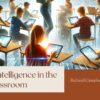You could learn about space, history, and science without getting up from your seat in a classroom that is like a whole new world. That’s the magic the metaverse is bringing to education, and it’s just getting started. In this post, we’re going to take a closer look at the educational uses of the metaverse, diving into its benefits, real-world applications, and some important stuff to think about before jumping in.

The Metaverse Phenomenon
So, what’s this buzz about the metaverse? Well, think of it as a virtual world where you can do almost anything. It’s like stepping into a video game, but for learning. With a projected market size of a whopping $678.8 billion by 2030, the metaverse isn’t just a fleeting trend; it’s here to stay.
Benefits of the Metaverse in Education
- Imagine students visiting the pyramids of Egypt online or doing science experiments in a 3D lab. The metaverse brings subjects to life, making learning a blast.
- Speedy and Fun Learning: Remember how slow and sometimes boring classes can be? Not in the metaverse! Studies show that learning in virtual environments can be way quicker and more engaging.
- Anyone Can Learn: The metaverse allows everyone, including those with special needs, to learn. It’s like having a VIP pass to education.
- Practice Makes Perfect: Ever wanted to try something risky without the risk? The metaverse lets students do just that. They can experiment and practice skills safely, making mistakes without real-world consequences.
How the Metaverse is Used in Education

- Virtual classrooms: Imagine a metaverse where you can do cool things with classmates as avatars from anywhere!
- Simulated Experiments: No need for expensive lab equipment anymore. The metaverse lets students dive into virtual labs and learn by doing, all in a safe, simulated environment.
- Gamified Learning: Learning in the metaverse can feel like playing a game. It’s fun, interactive, and keeps students hooked on learning.
- AI and big data enable personalized learning paths in the metaverse, helping track progress and improve learning.
Challenges to Consider
- Gear Up: The fancy VR headsets and equipment needed for the metaverse can be pricey. But as more people use it, prices might drop.
- Data security is crucial in the metaverse due to the large amount of personal data.
- Balance Matters: It’s easy to become lost online. Setting restrictions and emphasizing real-world interactions can maintain balance.
Ethical Considerations in the Educational Use of the Metaverse
When we talk about the metaverse in education, it’s not just about the cool tech – it’s also about handling student data with care. For example, in the metaverse, a lot of information is collected about how students learn and how they interact with each other. Here’s where the big ethical questions pop up.

- Consent is King: First up, getting clear consent. It’s vital that students and their guardians understand what data is collected and how it’s used. This isn’t just a legal thing; it’s about respecting privacy.
- Who Owns the Data?: Then there’s the question of data ownership. Who gets to keep and use this data? And for how long? It’s essential to have transparent policies here.
- Safety First for Vulnerable Learners: We’ve got to be extra careful with vulnerable learners. Ensuring their data isn’t misused or exploited is a top priority.
Teacher Training and Support
Now, let’s shine a spotlight on the teachers. They’re the ones steering this virtual ship, after all.
- Training for the Digital Dive: Teachers will need solid training to navigate the metaverse. This means not just tech training, but also learning how to create engaging virtual lessons.
- Managing the Virtual Classroom: Classroom management gets a whole new twist in the metaverse. Teachers will need strategies to keep students engaged and on track in this virtual world.

The Role of Traditional Education
The metaverse sounds like a game-changer, but where does it fit with old-school books and blackboards?
- Complement, Not Replace: The metaverse shouldn’t kick traditional education to the curb. Instead, it should add spice to it, offering experiences that traditional methods can’t.
- Blended Learning: Think of it as a tag team. The metaverse can offer hands-on, immersive experiences, while traditional methods provide the solid, foundational knowledge.
Long-term Impact and Sustainability

It’s easy to get caught up in the now, but what about down the road?
- Social and Emotional Development: How will learning in a virtual world affect students’ real-world social skills? We need to keep an eye on this.
- Eco-footprint of Tech: Also, all this fancy tech has an environmental cost. Sustainable practices in tech use and development will be key.
Accessibility and Inclusivity
Making sure everyone gets a fair chance in the metaverse is crucial.
- Breaking Down Barriers: For students with disabilities or from lower-income backgrounds, access to the metaverse can be tricky. Addressing these barriers is a must for true inclusivity.
- Digital Literacy for All: Ensuring that everyone’s got the skills to use this tech is another big step towards inclusivity.
Beyond the Hype
While the metaverse is exciting, there are challenges to consider. VR equipment can be pricey, and data privacy and potential addiction are valid concerns. However, if we approach it thoughtfully, the metaverse has the power to transform education, opening doors to a brighter future of learning.
Ready to explore the metaverse in your classroom? Let’s chat about custom solutions and ensure a smooth transition into this digital frontier. Together, we can unlock the true potential of the metaverse for education!
Frequently Asked Questions
What are the key benefits of the educational uses of the metaverse?
The metaverse in education makes learning super fun and interactive. It’s like being in a 3D game where you learn things faster and get to try out stuff without any real-world risks. It’s a cool way to understand tough subjects because it feels like you’re right there in the action.
How do the educational uses of the metaverse enhance traditional teaching methods?
The metaverse adds a lot of fun to regular classroom learning. It lets students go on virtual trips and do experiments in a computer world. This way, they can learn things that are hard to show in a normal classroom. It’s like having a special tool that makes learning extra interesting.
What ethical considerations should be kept in mind regarding the educational uses of the metaverse?
When using the metaverse for learning, we need to be careful with students’ private information. It’s important to make sure everyone knows how their data will be used and to keep it safe. We also have to be extra careful to protect students who might need more help, like those with disabilities.
What teacher training and support are necessary for the educational uses of the metaverse?
Teachers need to learn how to use this new metaverse tech. They should know how to make fun virtual lessons and keep students interested and behaving well, even when they are learning in a virtual world.
How can the educational uses of the metaverse ensure long-term impact and sustainability?
To make sure the metaverse is good for education in the long run, we need to balance it with regular teaching. We also have to think about how using all this tech affects our planet and students’ feelings and behavior.
In what ways do the educational uses of the metaverse promote accessibility and inclusivity?
The metaverse in education is great for including everyone. It helps students who might have trouble in a regular classroom, like those with disabilities or who can’t afford certain things. It gives everyone a chance to learn in a way that works best for them, no matter where they are or what they need.









Recent Comments